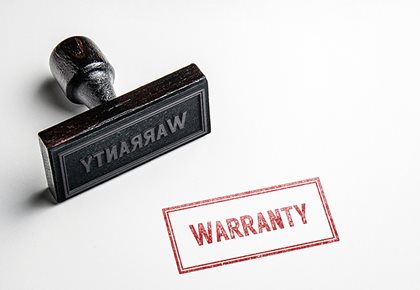Friday January 20, 2017
What are community association warranties?
 When your homeowners association took control of your community from the developer, a lot of paperwork came with that. Some of the paperwork undoubtedly included a number of warranties. Since then, you have probably collected warranties for a range of products and services your association has purchased. But be honest: How familiar are you with them?
When your homeowners association took control of your community from the developer, a lot of paperwork came with that. Some of the paperwork undoubtedly included a number of warranties. Since then, you have probably collected warranties for a range of products and services your association has purchased. But be honest: How familiar are you with them?It’s likely that you and your fellow board members haven’t really paid much attention to your warranties—unless something has broken down. However, not knowing what your warranties cover—and even more importantly, what you are required to do to maintain that protection—can hurt your association.
“Board members often don’t realize that most warranties require the association to fulfill certain obligations,” says Bill Worrall, vice president at FirstService Residential. “By not knowing what those obligations are, the board risks invalidating the warranties.”
No matter what a warranty covers—whether it ensures the quality of a contractor’s workmanship, that major equipment will function properly or that components are free from defects—your association should do everything it can to keep it valid, beginning with these five steps:
A guide to managing your community associaiton warranties
-
Hire the right professionals to inspect any new equipment, components or construction.
“I can’t stress this enough,” says Worrall. “You should never ask your property manager or anyone else who isn’t qualified to do your inspections just to save a little money. Your manager is (probably) not a licensed professional engineer.” However, a good property management company with a strong local presence will be able to steer you to highly qualified engineers or other appropriate experts.
-
Keep all your warranties on file.
Along with receipts, it is crucial to hold onto the warranties for each service, piece of equipment and structure your association purchases. Don’t just keep them in a pile somewhere. Make sure they are organized and easy to locate in case you need to reference them quickly.
-
Assign someone to be responsible for warranties.
You need to make sure that somebody actually reads each warranty. Although this may seem obvious, according to Worrall, “This is something that few people do.” Reviewing warranties does not require any particular background or skill, so consider assigning it to one or more of your board members, your property manager (if you are working with a professional management company), a committee member or another volunteer.
Certain warranties, such as those provided by some roofing companies, require that you register the warranty. If this is not done within a specific time period, the warranty may no longer be valid. The same person who reviews your warranties should also take responsibility for meeting registration requirements.
-
Have your association attorney explain the legal aspects that you don’t understand.
These days, many warranties can be quite complex. As Worrall explains, “They have become more of a legal document and are usually written by attorneys.” For this reason, he says that it is especially important to enlist your association attorney’s help to make sense of it.
Before handing it over, however, Worrall recommends separating out the easy-to-understand sections so you are only providing those portions that require legal expertise. This precludes your attorney from spending time (and your association’s money) reading and evaluating sections of the document you already understand.
-
Ask the person who provided the warranty to explain it in depth to your leadership.
Inviting the contractor, installer or manufacturer to do a presentation about the warranty to your board and property manager can be very useful. This can help clarify, for instance, which types of issues are covered by the manufacturer’s warranty and which are the responsibility of the contractor. It also offers an opportunity for everyone who will be responsible for maintaining the warranty to ask questions, hear the answers firsthand and discuss the most effective way to fulfill your association’s obligations.
-
Tie your preventive maintenance programs to your warranties.
You should already have a schedule in place for performing preventive maintenance on your equipment and structures. Anytime you purchase something new, check the obligations described in the warranty, and set your preventive maintenance schedule to coincide with those obligations. A roof warranty, for example, will not provide coverage if you have neglected to clear debris from roof drains.
Keep a log detailing what services were performed and when. Get a signature and contact information from the person who performed the service. You may need this if you ever have to invoke the warranty.